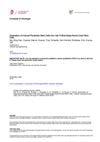Search
forLearn
2 / 2 resultslearn Osteopontin
signaling protein that, when suppressed, may grow hair by reducing inflammation and stem cell loss
Research
5 / 1000+ results
research Combination of Media, Biomaterials, and Extracellular Matrix Proteins to Enhance the Differentiation of Neural Stem/Precursor Cells into Neurons
Using certain small proteins with a growth factor and specific materials can increase the creation of neurons from stem cells.

research Wnt Signaling Regulates Symmetry of Division of Neural Stem Cells in the Adult Brain and in Response to Injury
Wnt signaling helps control how brain stem cells divide and is important for brain repair after injury.

research Multipotent Neural Crest Stem Cell-Like Cells from Rat Vibrissa Dermal Papilla Induce Neuronal Differentiation of PC12 Cells
Rat whisker cells can help turn other cells into nerve cells and might be used to treat brain injuries or diseases.

research Generation of Induced Pluripotent Stem Cells from Hair Follicle Bulge Neural Crest Stem Cells
Hair follicle stem cells need all reprogramming factors to become pluripotent.
research Enhanced Expansion and Sustained Inductive Function of Skin-Derived Precursor Cells in Computer-Controlled Stirred Suspension Bioreactors
Using bioreactors, scientists can grow more skin stem cells that keep their ability to regenerate skin and hair.
Community Join
5 / 95 results
community Compressed part of research of theory of androgenic/anabolitic balance. AGA h-responders analytic. Theory of physio-metabolitic method of anti AGA treatment
The treatment for androgenetic alopecia involves using finasteride and minoxidil with intense exercise and cold exposure to boost metabolism and reduce androgenic effects, potentially leading to hair regrowth. This approach may activate biological pathways for improved hair and overall health.
community Fresh off the press: Dutasteride may cause chronic infertility
Dutasteride may cause chronic infertility by reducing semen volume and motility, with concerns about irreversible prostate fibrosis. Users consider switching to finasteride or using treatments like minoxidil and microneedling, weighing hair preservation against fertility.
community How do athletes maintain their hair transplants? Or do they not?
Athletes often use finasteride to maintain hair transplants, but some avoid it due to potential hormonal effects. Notable examples include Mo Salah and Conor McGregor, while LeBron James has had multiple procedures with varying success.
community Finasteride - impact on Neurosteroids, which yes, \are important and not a garbage hormone
Finasteride may affect neurosteroids, impacting mood and sexual function, with varied user experiences. Some report side effects like depression and sexual dysfunction, while others find it effective for hair retention or prefer alternatives like Dutasteride or topical treatments.
community Finasteride does deplete important nuero-active steroids
Finasteride can reduce neuroactive steroids, causing side effects like depression, anxiety, and sexual dysfunction. Some users experience persistent symptoms after stopping finasteride, while others use alternative treatments like topical solutions.